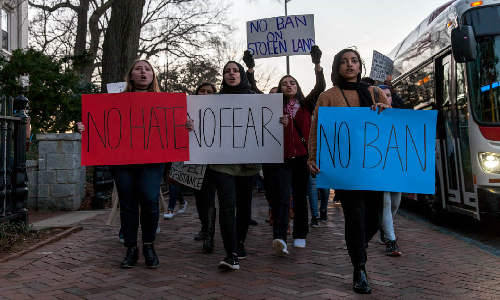Immigration Ban Finds Support Amongst Arab Leaders

The president of the United States of America, on the 27th of January, passed into law an executive policy themed “Securing the country from an alien terrorist entry in the United States of America.”
This policy puts on hold acceptance of refugee and asylum seekers for around 120 days and puts a restriction on the number of asylum seekers coming into the United States to around 50,000. The country put an impermanent ban on admission from around six countries namely Syria, Yemen, Iran, Libya, Somalia, and Yemen.
The policy is scheduled to move through a plethora of courtrooms. It has received a barrage of negative responses.
Almost everyone is against the president’s immigration policy and his decisions. But this policy should be viewed in context. I was in the Middle East and parts of the northern African region for about 13 years. 13 years, I tell you.
And if there is anything I can assure you, it’s that middle eastern Muslim countries, especially the UAE, enforces even more stringent migration laws than the United States do.
Migrants make up about 85% of the United Arab Emirates’ population. Also, migrants make up more than 60% of the Emirates’ labour department. Given their immense migration number, the United Arab Emirate enacts stringent orders concerning citizenship and naturalisation.
Unlike the United States of America, the United Arab Emirates does not assure you of citizenship so quickly.
The United States work based on birthright; the UAE doesn’t, especially when the individual is not a Muslim.
Kids born to immigrants take the country of their parents, and there is no such thing as a dual nationality. An offspring would be given citizenship if, and only if, his father is a national of the United Arab Emirate. To become eligible to be a citizen, individuals from Arab nations must reside in the United Arab Emirates for about seven years or more, while those who are from countries not belonging to the Arab Gulf must reside in the nation for around three decades.
To become a citizen via marriage union, a woman from a foreign nation must be joined in matrimony to a citizen who is a Muslim for at least a decade. In the United Arab Emirates, the journey from being an immigrant to a full-fledged citizen is a very hard and elongated process, and only a handful get to be eligible.
For More Immigration News & Updates Follow Us @Facebook
Advertisement
April 21, 2015
June 16, 2015
February 07, 2014
Australia has returned forty five Sri Lankan boat people hom...
Hi! How can we help you?
Click below button to start chat
